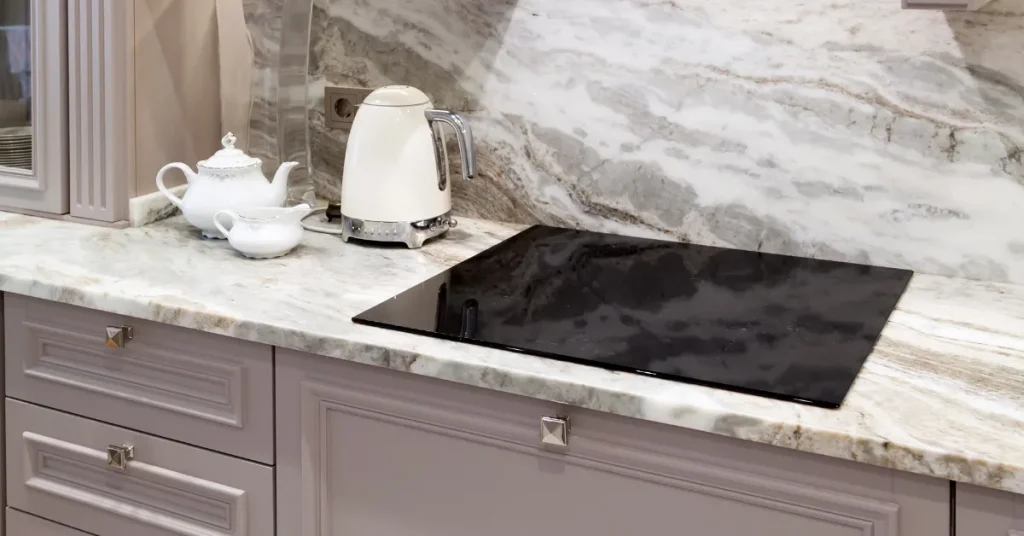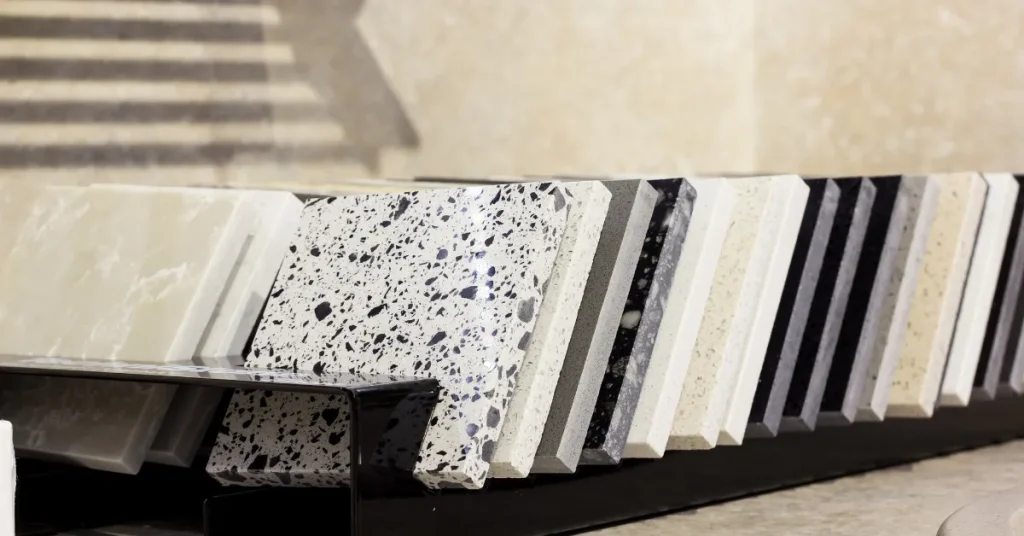Quartz countertops typically measure between 1.25 and 1.5 inches thick. This standard thickness ensures durability and aesthetic appeal.
Quartz countertops are a popular choice for modern kitchens and bathrooms, owing to their durability, non-porous surface, and sleek appearance.
The standard thickness caters to both structural integrity and visual proportions, making it a practical option for most homeowners.
These engineered stone surfaces come in a variety of colors and patterns, offering a luxurious look without the maintenance required for natural stone.
With their built-in resistance to stains, scratches, and heat, quartz countertops provide a practical solution for busy households seeking a balance of function and style.
The versatile design options and consistent thickness make quartz a go-to material for designers and contractors aiming to combine quality and elegance in their projects.

Unveiling Quartz Countertops
Quartz countertops bring elegance and durability to kitchens worldwide. Imagine a surface that resists scratches and stains. That’s the magic of quartz. It is as tough as it is beautiful. This post digs into the thickness of these sturdy surfaces.
The Rise Of Quartz In Modern Homes
Quartz has taken center stage in contemporary interiors. Its popularity soars due to its unmatched quality and aesthetic appeal. Homeowners and designers are selecting quartz over other materials, creating a trend that marries luxury with practicality.
Composition And Benefits
- Quartz is a blend of natural quartz and resin – a recipe for resilience.
- It boasts a non-porous surface that repels spills and bacteria, guaranteeing cleanliness and safety.
- Its durability stands up to daily use, ensuring a long-lasting investment.
Knowing these facts, let’s explore quartz thickness. Typical quartz countertops come in 1.25 inches (3 cm) standard thickness. However, options may vary.
Thickness can start at 0.75 inches (2 cm) for a sleek look or go beyond the standard, up to 1.5 inches (4 cm), for a chunkier feel. Whichever you choose, quartz remains a timeless choice for any home.
Standard Measurements In The Industry
When choosing the perfect quartz countertop, thickness plays a key role. Most industry standards revolve around specific measurements.
These set the tone for durability and aesthetic appeal. Let’s dive into the standard thickness measurements you’ll find when shopping for quartz countertops.
Conventional Thickness Options
Quartz countertops come in various thicknesses. Two standard thickness levels dominate the market:
- 2 cm, or approximately 3/4 inch: Ideal for small areas and decorative panels.
- 3 cm, or about 1 1/4 inches: Preferred for kitchen counters and islands.
Some suppliers may offer other thicknesses, like 1 cm or 1.5 cm. These, however, are less common.
Impact Of Thickness On Durability And Aesthetics
Thickness influences a countertop’s look and feel.
| Thickness | Durability | Aesthetics |
| 2 cm | Less durable, may need support | Sleek, modern profile |
| 3 cm | More durable, stands alone | Bolder, substantial look |
Heavier use surfaces benefit from thicker quartz. A 3 cm countertop withstands more wear and tear. The thicker edge also offers a luxurious appearance.
Digging Deeper Into Thickness Variations

Think about your kitchen. What makes it stand out? Often, it’s the gleaming, smooth surface of a countertop. In homes today, quartz countertops shine as a popular choice, not just for their beauty but also for their durability.
Let’s look closer at thickness variations in quartz countertops and how they fit into your home’s design and function.
Thin Vs. Thick Countertops: Pros And Cons
Countertops come in varying thicknesses, each with its benefits. The debate between thin and thick quartz countertops might confuse many.
| Countertop Thickness | Pros | Cons |
| Thin (1-2 cm) | Lighter weightLess expensiveModern look | Less durableMay require plywood support |
| Thick (3 cm) | StrongerLuxurious feelNo extra support needed | HeavierHigher cost |
Measuring Your Space For The Perfect Fit
Getting the right fit for a quartz countertop means measuring your space accurately. A perfect fit ensures durability and aesthetic appeal.
- Clear the area and measure the base cabinets.
- Account for overhang—usually 1 to 1.5 inches.
- Consider appliance and fixture cutouts.
- Check depth for backsplash elements.
- Consult with a professional for corners and complex shapes.
A tailored fit not only looks stunning but also supports the countertop’s longevity.
Installation Insights
Understanding the installation of quartz countertops is just as important as their design. The process involves specifics about weight, support, and whether or not to tackle the project on your own. Let’s explore the critical aspects of installing these elegant, durable surfaces.
Professional Installation Vs. Diy
Installing quartz countertops can be challenging. Skills, tools, and precision are key. Here’s what you need to consider:
- Professional installation ensures accuracy and quality. Experts manage the heavy lifting, cutting, and fitting.
- DIY installation could save money but risks mishaps. It’s only recommended for those with experience and the right tools.
Weight Considerations And Support Requirements
Quartz countertops are heavy, with typical thickness around 1.25 inches (3 cm). Their weight affects installation in several ways:
| Thickness | Weight per Square Foot | Support Needed |
| 2 cm | Approx. 12.8 lbs | Cabinets and secured brackets |
| 3 cm | Approx. 18 lbs | Stronger cabinets, additional bracing |
Proper support is non-negotiable for quartz. Always ensure you have the following:
- Sturdy cabinet boxes to bear the weight
- Additional support for overhangs exceeding 10 inches
- Correct setting and leveling to prevent cracks
Maintaining Your Quartz Countertops

Quartz countertops marry elegance with durability. A smart investment for any kitchen or bathroom, they come with a promise of longevity. Yet, their lifespan significantly hinges on the care they receive day in and out.
Learning to maintain your quartz surfaces properly is essential. It ensures they remain as stunning as the day they were installed. Let’s explore expert tips to keep them in pristine condition.
Daily Care Tips
Keeping your quartz countertops sparkling clean need not be a tough task. Establish a daily cleaning routine with simple steps:
- Wipe spills immediately – to prevent stains.
- Use soft cloths – for gentle cleansing.
- Warm water and mild dish soap – act as a safe cleaning solution.
- Avoid harsh chemicals – like bleach or abrasive cleaners.
Consistency in these practices will keep your countertops looking their best.
Long-term Preservation Strategies
Invest in the future of your quartz countertops with these strategies:
- Use cutting boards – to guard against scratches.
- Place trivets or mats – hot pots shouldn’t touch the surface directly.
- Avoid prolonged sun exposure – which can lead to discoloration over time.
- Renew the sealant – if recommended by the manufacturer.
Adopting these habits can help prevent damage that might occur over years of use.
Creative Applications And Design Ideas
Seeking fresh ideas for your living space? Think quartz countertops. Not just for kitchens, their versatility shines in countless ways. Here are some innovative ideas to make quartz work in your decor.
Integrating Quartz Into Your Decor
- Quartz Wall Art: Transform walls into focal points with quartz panels.
- Furniture Inlays: Jazz up tables or cabinets with quartz inserts.
- Accent Shelves: Use thin quartz slabs for sleek, floating shelves.
- Decorative Frames: Surround mirrors or pictures with quartz for elegance.
Innovative Edging And Finish Options
Edges and finishes add character to quartz countertops. Select from these trendy options:
| Edge Style | Visual Appeal |
| Beveled | Crisp angles creating depth and shadow |
| Bullnose | Smooth, rounded edge for a classic look |
| Ogee | Intricate, curvy profile for a touch of sophistication |
| Waterfall | Quartz cascading down the sides of islands or counters |
For finishes, go glossy for brilliance or matte for understated charm. Textured finishes are in too.
FAQs About How Thick Are Quartz Countertops
How Thick In Inches Is A Quartz Countertop?
A quartz countertop typically measures about 1. 25 inches in thickness. This standard size provides a balance of durability and aesthetic appeal for kitchen and bathroom surfaces.
Which Is Better 2cm Or 3cm Quartz?
The choice between 2cm and 3cm quartz depends on your needs. 3cm quartz provides more durability and strength, ideal for high-traffic areas. 2cm is lighter and may require additional support. Assess your project’s requirements for the best option.
How Thick Is Quartz Countertop From Home Depot?
Quartz countertops from Home Depot typically have a standard thickness of 1. 25 inches. This dimension suits various kitchen styles and durability needs.
What Is The Thinnest Quartz Slab?
The thinnest quartz slabs typically measure around 6mm in thickness. These ultra-thin surfaces are ideal for modern design applications.
Conclusion
Selecting the ideal quartz countertop thickness is crucial for both aesthetic appeal and functionality. Standard thicknesses typically range from 1 cm to 3 cm, with each offering unique benefits for different applications.
Remember to consider the durability, installation requirements, and visual impact when choosing your quartz countertop.
Your perfect kitchen awaits with the right selection!
Resources:
1. https://blogs.cdc.gov/niosh-science-blog/2014/03/11/countertops/
